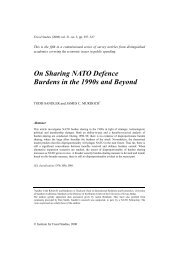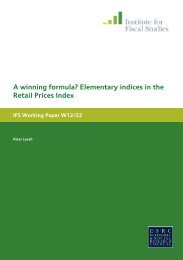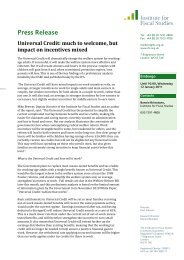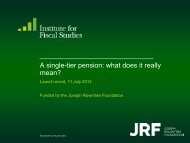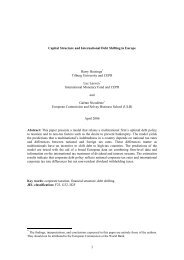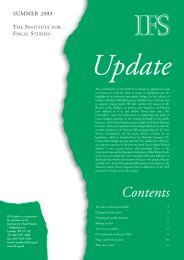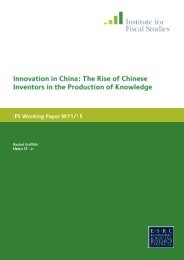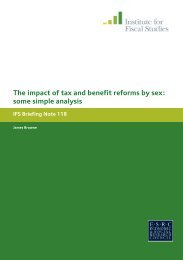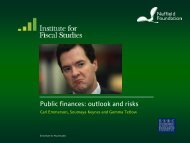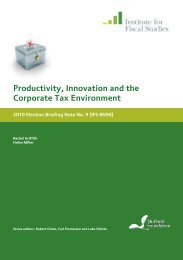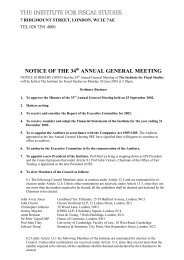A single-tier pension: what does it really mean? - The Institute For ...
A single-tier pension: what does it really mean? - The Institute For ...
A single-tier pension: what does it really mean? - The Institute For ...
You also want an ePaper? Increase the reach of your titles
YUMPU automatically turns print PDFs into web optimized ePapers that Google loves.
Short-run effect on <strong>pension</strong>er incomes<br />
has spent on average 32 years in employment. <strong>The</strong>se and other characteristics<br />
are described in Table A.1 in Appendix A. 42<br />
As shown in Table 4.4, the average increase in state <strong>pension</strong> income for men at<br />
SPA under the proposed system is 86p per week; this compares w<strong>it</strong>h £4.34 per<br />
week for women. Table 4.4 also provides some indication about which types of<br />
individuals gain the most. Women who have ever paid reduced-rate NI<br />
contributions are set to gain on average £5.22 per week, while people who have<br />
been self-employed for more than 10 years stand to gain £6.66 per week. A large<br />
proportion of individuals who have been in self-employment would gain, but<br />
notably not all. Among those who have been self-employed for more than 10<br />
years, 36% would gain, compared w<strong>it</strong>h 25% of those who have been selfemployed<br />
for between 6 and 10 years. (Those reaching SPA in 2019 are much<br />
more likely to gain than those reaching SPA between 2016 and 2018 because of<br />
the compos<strong>it</strong>ion of individuals – 53% of those reaching SPA in 2019 are women,<br />
compared w<strong>it</strong>h 28% in 2016, 23% in 2017 and 28% in 2018. 43)<br />
Those w<strong>it</strong>h lower levels of household total wealth per head are also more likely<br />
to benef<strong>it</strong>: 36% of the least wealthy fifth of individuals would benef<strong>it</strong>, compared<br />
w<strong>it</strong>h 9% among the wealthiest fifth. <strong>The</strong> <strong>mean</strong> change in <strong>pension</strong> income at SPA<br />
among the least wealthy fifth of individuals is an increase of £3.99 per week,<br />
compared w<strong>it</strong>h £0.53 among the wealthiest fifth of individuals. However, since<br />
the least wealthy individuals are more likely to be eligible for <strong>mean</strong>s-tested<br />
benef<strong>it</strong>s, the interaction w<strong>it</strong>h <strong>mean</strong>s-tested benef<strong>it</strong>s and the proposed abol<strong>it</strong>ion of<br />
<strong>pension</strong> cred<strong>it</strong> savings cred<strong>it</strong> will have important implications for this conclusion<br />
– this is discussed in more detail in Section 4.4.<br />
Tables A.1 and A.2 in Appendix A present add<strong>it</strong>ional analysis of the<br />
characteristics of those who stand to gain and lose state <strong>pension</strong> income at SPA<br />
from the proposed reforms. 44<br />
How gains and losses change if individuals plan to contribute<br />
after April 2016<br />
<strong>The</strong> preceding analysis described how the state <strong>pension</strong> income that individuals<br />
could get at SPA under the new system would compare w<strong>it</strong>h ent<strong>it</strong>lements under<br />
current rules, assuming that individuals made no further contributions to the<br />
system beyond April 2016. <strong>For</strong> the very first cohort to be affected by the<br />
proposed reforms, this will be the final picture. However, for later cohorts, the<br />
ultimate pattern of gains and losses (relative to <strong>what</strong> could be achieved under the<br />
42<br />
Appendix A is available online at http://www.ifs.org.uk/docs/report_<strong>single</strong><strong>tier</strong>_<strong>pension</strong>_appendices.pdf.<br />
43 This is simply because of the way that the female state <strong>pension</strong> age is being increased between<br />
2016 and 2018, while the state <strong>pension</strong> age for men will not start increasing until 2018.<br />
44<br />
Appendix A is available online at http://www.ifs.org.uk/docs/report_<strong>single</strong><strong>tier</strong>_<strong>pension</strong>_appendices.pdf.<br />
35



